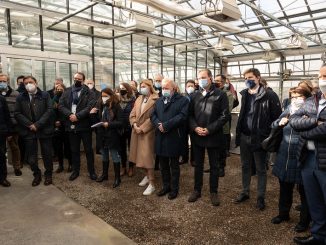
Last minute political manoeuvres, coalition collapse and legal challenges – the Nature Restoration Law’s dramatic final showdown proved every bit as tumultuous as the rest of its path to adoption. But could the final seal of approval of this law be reversed? As Natasha Foote outlines, the answer seems to be no – here’s why.
After months at an impasse, ministers gave their final blessing to the EU’s Nature Restoration Law (NRL) on Monday (17 June), marking the last milestone for the law to enter into force.
But, because it’s the NRL and nothing has gone smoothly for this law, there was more drama waiting around the corner after the Austrian environment minister, Leonore Gewessler, went rogue, ignoring the wishes of the Chancellor.
Thanks, at least in part, to Austria’s last minute support, the law then passed by a narrow margin with just over 1% of the necessary majority.
In doing so, she risked her job, the whole Austrian government’s coalition agreement, and possibly even jail – but did she also risk invalidating the outcome of the vote? That was the question on everyone’s lips in the aftermath.
The answer seems to be no – here ARC digs into why.
The EU’s Nature Restoration Law has been Approved – but Don’t Put the Bubbly on Ice Just Yet
What happened?
The crux of the issue is that there was no consensus back home from Austria’s 9 regions – something which, for the Austrian Chancellor, meant the minister should abstain from the vote.
But Gesweller broke ranks.
Needless to say this didn’t go down well back home, with the Chancellor immediately promising to seek to nullify the decision at the European Court of Auditors on the basis that Gesweller’s vote was illegitimate.
But this doesn’t hold weight, according to legal experts.
‘No leg to stand on’
“From the EU law perspective, she is the Minister. She gets the vote right, so I don’t think they have a leg to stand on really,” R. Daniel Kelemen told ARC. Kelemen is McCourt Chair at the McCourt School of Public Policy at Georgetown University where he focuses on EU law and policy,
Likewise, for Christophe Hillion, Professor of European law and Chair in EU institutional law at the University of Leiden, this is “primarily a domestic matter, to be addressed/solved at Austrian level”.
But was Gesweller a legitimate representative of Austria in this vote?
For Kelemen, the answer is yes – because this decision has nothing to do with the EU. “There are internal rules determining the degree to which they can or can’t instruct the Minister to vote a certain way. But that’s their own issue,” Kelemen explained.
In other words – it’s not the EU’s problem that Austria picked a representative that went rogue for this one vote.
This is also the reading that the Belgian Presidency has of the situation. According to a representative for the Belgians, the Council’s legal service has confirmed that “the minister represents her country and the vote she makes is legally binding”.
Reiterating that she was “registered as representing her country,” the representative added that, as the Presidency, they “base [them]selves on votes in the Council”.
In the unlikely event that the Minister’s breach was somehow proven to be legally illegitimate, Leiden’s Hillion said there might then theoretically “be some consequences at EU level” – but the professor called this a “long stretch”.
But could the European Court intervene?
According to Kelemen, Austria (or, indeed, another member state, or even an Austrian region), has the right to bring this to the European Court of Justice for what they call an ‘action for annulment’. But the Court is unlikely to want to open that Pandora’s box, according to the expert.
“That could mean governments could say after votes, ‘well, that isn’t really how we wanted our minister to vote’- it could lead to challenging lots of laws,” he pointed out. “I couldn’t imagine the European Court really wanting to wade into that,” he said.
For the professor, this is “a bit desperate” on Austria’s behalf, calling it a “storm in a teacup”.
Likewise, Leiden’s Hillion said he is “not sure that the ECJ would want to create a precedent whereby a government could challenge the behaviour of its own minister(s) acting in Council before it”, suggesting it would be wary of bringing EU judges into member state internal constitutional affairs.
But could legal proceedings like this delay the entry of the law into force? The answer also appears to be no.
This is because actions for annulment “do not have an automatic suspending effect on the law in question”. “The law remains valid until and unless it is struck down,” Keleman said, adding that this is “not a way to stall the law from going into effect”.
“It’s just going to go on its own regular schedule until a ruling is made – and I really doubt we’ll even ever get there,” he said.
The summary?
Bottom line? While there could be more repercussions at the Austrian level, this is unlikely to impact the proceedings of the EU level.
“It was just a minister doing something partly out of principle and partly for her own domestic political reasons,” Kelemen pointed out, adding that it speaks “much more to the internal tensions in Austria rather than something to do with the EU”.
A separate diplomatic source, who chose to remain anonymous, reinforced this, emphasising that they don’t see any issue at the EU level. “Whether that will lead to legal action in Austria… time will tell,” the source added.
For Hillion, this could possibly be a breach of a political rule of conduct within the cabinet, i.e. duty of governmental solidarity, meaning the Chancellor could sack her for this disloyalty ,or maybe even more.
However, Kelemen pointed out that, in the event there’s no unanimity among the regions, then it’s “up to the minister’s discretion how to vote”. “As Vienna changed position, the unanimity was broken, so that’s how she justified it,” he said.
This means that while this could cause a “big storm of internal Austrian coalition politics,” Austria is “unlikely” to pursue the annulment action very far because it is “unlikely it could really go anywhere”.
ARC will follow up with more information on what the next steps will be for the law. Stay tuned for more. Below find most of our dedicated reporting on this most tumultuous of files from its announcement in June 2022.
More
The EU’s Nature Restoration Law has been Approved – but Don’t Put the Bubbly on Ice Just Yet
Survey Shows Huge Support for Nature Restoration Law in Blocking Member States
Eleven Member States make last bid to save EU’s nature restoration law – but will it bear fruit?
EU’s Nature Restoration Law at Critical Juncture after Pushback by Member States
Nature Restoration Law Passes Final Hurdle in Parliament, Now Set to Become Law
Nature Restoration Law Emerges from Trilogue – What’s Changed?
European Parliament Adopts a Weakened Nature Restoration Law – next step Trilogue
Big Step Forward for Nature Restoration Law – Council of Ministers Agrees its Position
Nature Restoration Law | No, 10% of land will NOT be abandoned under NRL
Nature Restoration Law News – Environment Committee Edging Towards Deal as EPP walks out
How will Environment Committee vote on Nature Restoration Law?
Agri MEPs Vote to Reject the Nature Restoration Law – what’s next?
Nature Restoration Law | Agri Committee’s Amendments Revealed – Reduced Targets, Increase Exemptions
EPP Attacks Pesticide Regulation & the Nature Restoration Law
Nature Restoration Law: A Chance for the EU to Make Good on the Green Deal





